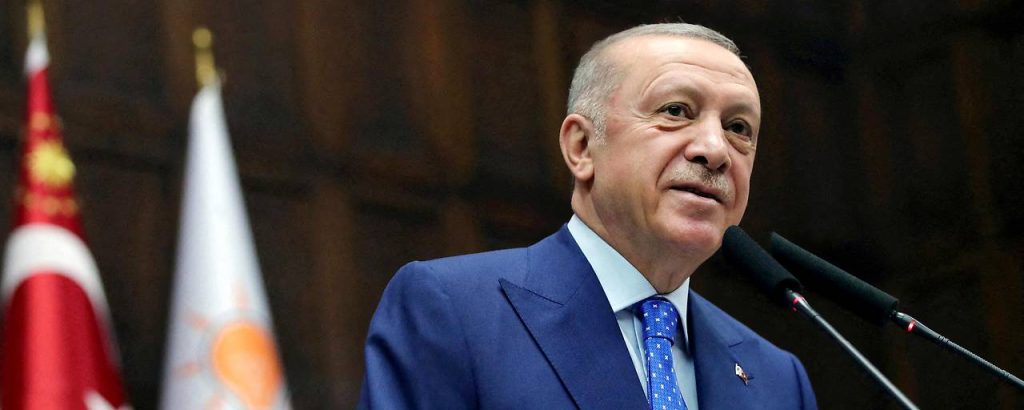
„VON TERRORISTEN SÄUBERN“
Der türkische Präsident Recep Tayyip Erdogan hat Ziele für den erwarteten neuerlichen Militäreinsatz in Nordsyrien genannt. Die Türkei wolle eine „neue Phase“ einleiten und die Orte Tall Rifat und Manbij von „Terroristen“ der syrischen Kurdenmiliz YPG „säubern“, so Erdogan. Unklar ist, ob er dafür grünes Licht aus Washington erhält. Und offen ist auch, wie sich eine solche Offensive auf die NATO-Erweiterung auswirkt
Laut Erdogan sollten nach den beiden Orten „schrittweise“ auch andere Regionen einbezogen werden. Erdogan hatte bereits vergangene Woche mit einem neuen Militäreinsatz der Türkei in dem Nachbarland gedroht, der bis zu 30 Kilometer in syrisches Gebiet führen könnte.
Auch frühere türkische Militäreinsätze in Syrien waren vor allem gegen die YPG gerichtet. Die Regierung in Ankara betrachtet die Miliz als Ableger der verbotenen Arbeiterpartei Kurdistans (PKK) und ebenfalls als Terrororganisation. Die USA dagegen sieht die YPG im syrischen Bürgerkrieg als Partner im Kampf gegen die Terrormiliz Islamischer Staat (IS).

YPG droht mit Ende des Kampfes gegen IS
Die Kurdenmiliz kündigte an, im Falle eines türkischen Angriffs den Kampf gegen den IS einzustellen. Die YPG wolle ihre „militärischen Maßnahmen“ dann stattdessen gegen die türkische Invasion richten, wie der Sprecher der von Kurdenmilizen angeführten Syrischen Demokratischen Kräfte (SDF) in Syrien der dpa sagte. Das und die Auslieferung eines langjährigen Alliierten in der Region würden das Vertrauen in die Verlässlichkeit Washingtons – die nach dem überstürzten und fehl gelaufenen Abzug aus Afghanistan ohnehin schwer erschüttert ist – wohl weiter stark beschädigen.
Andererseits blockiert der NATO-Partner Türkei derzeit die Aufnahme Finnlands und Schwedens in das Verteidigungsbündnis. Ankara argumentiert damit, beide Länder würden die PKK und die YPG unterstützen. „Wer Waffen und Ausrüstung, die sie der Türkei trotz Bezahlung vorenthalten, gratis an die Terrororganisation übergibt, verdient den Titel eines Terrorstaates, nicht eines Rechtsstaates“, sagte Erdogan am Mittwoch.
Schwedens Außenministerin Ann Linde dementierte unterdessen, dass ihr Land schwedische Panzerabwehrwaffen an Kurden geliefert habe. Unter Verweis auf eine von ihr auf Twitter verbreitete Erklärung der schwedischen Behörde für strategische Produkte (ISP) schrieb sie, Schweden habe keine Exportlizenzen für militärische Ausrüstung für kurdische Einheiten bewilligt.
Erdogans innenpolitische Außenpolitik
NATO-Partner wie Deutschland, aber auch andere EU-Länder wie Schweden, haben aus Protest gegen eine Offensive der Türkei gegen die YPG in Nordsyrien 2019 Rüstungslieferungen in das Land teilweise gestoppt. Die Türkei will zudem von den USA F-16-Kampfjets kaufen – in Washington war ein möglicher Deal zuletzt aber politisch umstritten. Das führt derzeit auch zu heftigen Erschütterungen der bilateralen Beziehungen mit Griechenland.
Erdogan kündigte am Mittwoch ein Abkommen mit Athen auf. Es werde „keine bilateralen Treffen mehr“ mit führenden griechischen Politikerinnen und Politikern geben, da diese „nicht ehrlich“ seien, so Erdogan am Mittwoch in einer Rede vor der Fraktion seiner Partei AKP im türkischen Parlament. In gut einem Jahr stehen Parlaments- und Präsidentschaftswahlen in der Türkei an. Angesichts der katastrophalen Wirtschaftslage inklusive horrender Inflation und einer Allianz der Opposition ist ein Wahlsieg Erdogans und seiner AKP derzeit nicht gewiss.
Links:
Erdogan names targets for Syria offensive
«CLEANSE OF TERRORISTS»
Turkish President Recep Tayyip Erdogan has named targets for the expected renewed military campaign in northern Syria. Turkey wants to launch a «new phase» and «purge» the towns of Tall Rifat and Manbij of «terrorists» from the Syrian Kurdish militia YPG, Erdogan said. It is unclear whether he will get the green light from Washington to do so. And also open is how such an offensive will affect NATO expansion.

According to Erdogan, other regions should be included «gradually» after the two places. Erdogan had already threatened last week to launch a new military operation by Turkey in the neighboring country, which could lead up to 30 kilometers into Syrian territory.
Previous Turkish military deployments in Syria were also primarily directed against the YPG. The government in Ankara considers the militia an offshoot of the outlawed Kurdistan Workers’ Party (PKK) and also a terrorist organization. The U.S., on the other hand, sees the YPG in the Syrian civil war as a partner in the fight against the terrorist militia Islamic State (IS).
YPG threatens to end fight against IS
The Kurdish militia announced it would stop fighting IS in the event of a Turkish attack. The YPG would then direct its «military action» against the Turkish invasion instead, the spokesman for the Kurdish militia-led Syrian Democratic Forces (SDF) in Syria told dpa. That and the surrender of a longtime ally in the region would likely further severely damage confidence in Washington’s reliability – which is already badly shaken after the hasty and misguided withdrawal from Afghanistan.
On the other hand, NATO partner Turkey is currently blocking Finland and Sweden from joining the defense alliance. Ankara argues that both countries support the PKK and the YPG. «Those who gratuitously hand over weapons and equipment, which they withhold from Turkey despite being paid, to the terrorist organization deserve the title of a terrorist state, not a state under the rule of law,» Erdogan said Wednesday.
Meanwhile, Sweden’s Foreign Minister Ann Linde denied that her country had supplied Swedish anti-tank weapons to Kurds. Referring to a statement she circulated on Twitter from the Swedish Strategic Products Agency (ISP), she wrote that Sweden had not approved export licenses for military equipment for Kurdish units.
Erdogan’s domestic foreign policy
NATO partners such as Germany, as well as other EU countries such as Sweden, have partially halted arms deliveries to the country in 2019 in protest of a Turkish offensive against the YPG in northern Syria. Turkey also wants to buy F-16 fighter jets from the U.S. – but a possible deal has recently been politically controversial in Washington. This is also currently causing severe tremors in bilateral relations with Greece.
Erdogan canceled an agreement with Athens on Wednesday. There will be «no more bilateral meetings» with leading Greek politicians because they are «not honest,» Erdogan said Wednesday in a speech to his party’s AKP faction in the Turkish parliament. Turkey’s parliamentary and presidential elections are just over a year away. Given the disastrous economic situation, including horrendous inflation, and an opposition alliance, an election victory for Erdogan and his AKP is currently not certain.
Left:
Turkish president
NATO
White House





